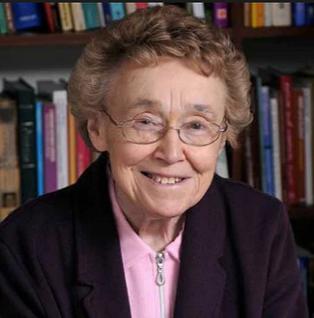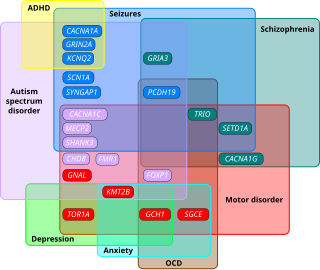
Asperger syndrome (AS), also known as Asperger's syndrome or Asperger's, is a term formerly used to describe a neurodevelopmental disorder characterized by significant difficulties in social interaction and nonverbal communication, along with restricted, repetitive patterns of behavior and interests. Asperger syndrome has been merged with other disorders into autism spectrum disorder (ASD) and is no longer considered a stand-alone diagnosis. It was considered milder than other diagnoses which were merged into ASD due to relatively unimpaired spoken language and intelligence.

Lorna Gladys Wing was an English psychiatrist. She was a pioneer in the field of childhood developmental disorders, who advanced understanding of autism worldwide, introduced the term Asperger syndrome in 1976 and was involved in founding the National Autistic Society (NAS) in the UK.
Pervasive developmental disorder not otherwise specified (PDD-NOS) is a historic psychiatric diagnosis first defined in 1980 that has since been incorporated into autism spectrum disorder in the DSM-5 (2013).

Autism spectrum disorders (ASD) are neurodevelopmental disorders that begin in early childhood, persist throughout adulthood, and affect three crucial areas of development: communication, social interaction and restricted patterns of behavior. There are many conditions comorbid to autism spectrum disorders such as attention-deficit hyperactivity disorder and epilepsy.
High-functioning autism (HFA) was historically an autism classification where a person exhibits no intellectual disability, but may experience difficulty in communication, emotion recognition, expression, and social interaction.
The following outline is provided as an overview of and topical guide to autism:

Self-stimulatory behavior, also known as "stimming" and self-stimulation, is the repetition of physical movements, sounds, words, moving objects, or other behaviors. Such behaviors are found to some degree in all people, especially those with developmental disabilities such as ADHD, as well as autistic people. People diagnosed with sensory processing disorder are also known to potentially exhibit stimming behaviors.
Jessica Kingsley Publishers (JKP) is a multinational publishing house headquartered in London. It was founded as an independent publisher in 1987 by Jessica Kingsley. Since 2017, JKP operates as an imprint of John Murray Press.

Like Colour To The Blind (1996) is the third in a series of four autobiographical works by internationally bestselling autistic author Donna Williams. Once published in the US using the American spelling 'color', it is now published worldwide by Jessica Kingsley Publishers using the UK spelling 'colour'. It has been published in several languages worldwide.

Dame Uta Frith is a German-British developmental psychologist and Emeritus Professor in Cognitive Development at the Institute of Cognitive Neuroscience at University College London (UCL). She pioneered much of the current research into autism and dyslexia. Her book Autism: Explaining the Enigma introduced the cognitive neuroscience of autism. She is credited with creating the Sally–Anne test along with fellow scientists Alan Leslie and Simon Baron-Cohen. Among students she has mentored are Tony Attwood, Maggie Snowling, Simon Baron-Cohen and Francesca Happé.
Social Stories were devised as a tool to help individuals with ASD better understand the nuances of interpersonal communication so that they could "interact in an effective and appropriate manner". Although the prescribed format was meant for high functioning people with basic communication skills, the format was adapted substantially to suit individuals with poor communication skills and low level functioning. The evidence shows that there has been minimal improvement in social interaction skills. However, it is difficult to assess whether the concept would have been successful if it had been carried out as designed.

Societal and cultural aspects of autism or sociology of autism come into play with recognition of autism, approaches to its support services and therapies, and how autism affects the definition of personhood. The autistic community is divided primarily into two camps; the autism rights movement and the pathology paradigm. The pathology paradigm advocates for supporting research into therapies, treatments, and/or a cure to help minimize or remove autistic traits, seeing treatment as vital to help individuals with autism, while the neurodiversity movement believes autism should be seen as a different way of being and advocates against a cure and interventions that focus on normalization, seeing it as trying to exterminate autistic people and their individuality. Both are controversial in autism communities and advocacy which has led to significant infighting between these two camps. While the dominant paradigm is the pathology paradigm and is followed largely by autism research and scientific communities, the neurodiversity movement is highly popular among most autistic people, within autism advocacy, autism rights organizations, and related neurodiversity approaches have been rapidly growing and applied in the autism research field in the last few years.

Classic autism, also known as childhood autism, autistic disorder, (early) infantile autism, infantile psychosis, Kanner's autism, Kanner's syndrome, or (formerly) just autism, is a neurodevelopmental condition first described by Leo Kanner in 1943. It is characterized by atypical and impaired development in social interaction and communication as well as restricted, repetitive behaviors, activities, and interests. These symptoms first appear in early childhood and persist throughout life.
Social thinking or thinking socially refers to a methodology created by Michelle Garcia Winner; it is described as a piece we all go through in our minds as we try to make sense of our others’ thoughts, feelings, and intentions in a situation, whether we are merely present, actively interacting, or observing (noticing) what is happening from a distance. Our ability to think socially is part of social learning that begins at birth and evolves across our lifetime. Social thinking in this context is also referred to as social cognition.

Rudy Simone is an American author of books on Asperger's Syndrome.
Autism-friendly means being aware of social engagement and environmental factors affecting people on the autism spectrum, with modifications to communication methods and physical space to better suit individual's unique and special needs.
Gunilla Gerland is a Swedish author and lecturer on the topic of autism. Her written works include Secrets to Success for Professionals in the Autism Field: An Insider's Guide to Understanding the Autism Spectrum, the Environment and Your Role and her autobiography A Real Person: Life on the Outside.

Jennifer Cook (formerly O'Toole) (born October 24, 1975) is an American author and speaker. She is known for her six Asperkids books, which have been translated into six languages and include the winner of the Autism Society of America's Book of the Year Award. Her memoir Autism in Heels: The Untold Story of a Female Life on the Spectrum is a Wall Street Journal Bestseller, a "Best Book" title winner by Publishers Weekly, and named a "Best Memoir" and one of both the "Best Autism Books of All Time" and "Best-Selling Autism Books of All Time" by BookAuthority. She is the on-camera autism expert in Netflix's series Love on the Spectrum.
Sex and gender differences in autism exist regarding prevalence, presentation, and diagnosis.
Caetextia is a term and concept first coined by psychologists Joe Griffin and Ivan Tyrrell to describe a chronic disorder that manifests as a context blindness in people on the autism spectrum. It was specifically used to designate the most dominant manifestation of autistic behaviour in higher-functioning individuals. Griffin and Tyrell also suggested that caetextia "is a more accurate and descriptive term for this inability to see how one variable influences another, particularly at the higher end of the spectrum, than the label of 'Asperger's syndrome'".










